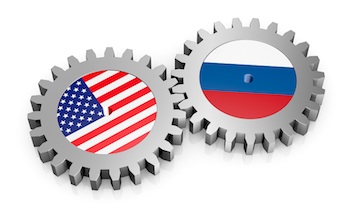Russia and the United States have agreed to cooperate on cybersecurity issues in order to prevent an accidental cyberwar between the two countries.
During talks at the G-8 Summit in Enniskillen, Northern Ireland, the U.S. and Russia agreed to cooperate on a number of security issues, including improving communications about cyber threat data and cyberweaponry. The agreement focuses on increasing transparency between the two countries and “reduce the possibility that a misunderstood cyber incident could create instability or a crisis in our bilateral relationship,” according to a fact sheet released by the White House on Monday.
 During the height of the Cold War, the leaders of the then-Soviet Union and the United States had a special hotline so that they could communicate directly to prevent a nuclear war neither side particularly wanted to happen on their watch. Popularly known as the “red telephone” even though no phones were actually involved, the system allowed the two countries to inform each other of activities that may be misconstrued as provocative. The new pact agreed upon at G-8 will take the Cold War-era Direct Secure Communication System and transform it into a regular exchange of information on hacking incidents and other cyber-attacks originating in their countries.
During the height of the Cold War, the leaders of the then-Soviet Union and the United States had a special hotline so that they could communicate directly to prevent a nuclear war neither side particularly wanted to happen on their watch. Popularly known as the “red telephone” even though no phones were actually involved, the system allowed the two countries to inform each other of activities that may be misconstrued as provocative. The new pact agreed upon at G-8 will take the Cold War-era Direct Secure Communication System and transform it into a regular exchange of information on hacking incidents and other cyber-attacks originating in their countries.
“We recognize that threats to or in the use of ICTs [Information and Communications Technologies] include political-military and criminal threats, as well as threats of a terrorist nature, and are some of the most serious national and international security challenges we face in the 21st Century,” Presidents Barack Obama and Vladimir Putin said in a joint statement released Monday.
In response to those threats, the leaders said both governments would work together to “create a mechanism for information sharing in order to better protect critical information systems.” To facilitate “the exchange of urgent communications that can reduce the risk of misperception, escalation, and conflict,” messages will be passed using the direct communications link between the U.S. Nuclear Risk Reduction Center (NRRC) and the Russian equivalent with the Ministry of Defense, according to the statement. NRRC currently handles all messages from allies relating to national security threats.
Finally, the White House and the Kremlin authorized a direct secure voice communications hotline between the American cybersecurity coordinator and the deputy secretary of the Russian Security Council in case they ever need to directly manage “potentially dangerous situations” arising from a security incident.
The current White House cybersecurity coordinator is Michael Daniel, the former chief of the Intelligence Branch of the Office of Management and Budget.
A bilateral working group will be formed within the next month to address threats to, or in the use of, ICTs in the context of international security. It will meet on a regular basis “to consult on issues of mutual interest and concern,” such as assessing emerging threats, as well as proposing and coordinating “concrete joint measures to address such threats as well as strengthen confidence,” the presidents said.
Within the next month, the Department of Homeland Security’s US Computer Emergency Readiness Team (US-CERT) and the Russian counterpart will begin exchanging “practical technical information on cybersecurity risks to critical systems” on a regular basis, the White House said. Technical information about malware and other malicious indicators will be included in the data exchanged, so long as the threats originate from either of the two countries.
“This kind of exchange helps expand the volume of technical cybersecurity information available to our countries, improving our ability to protect our critical networks,” the White House statement said.
The alliance is the result of more than two years of negotiations between the two countries over what information should be shared and how, according to the White House.
“These steps are necessary in order to meet our national and broader international interests,” Obama and Putin said in their statement.














